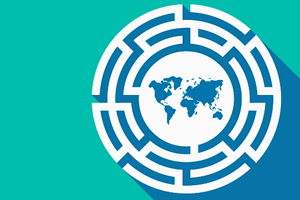
Coronavirus is in the news and on everyone’s mind. In fact, today’s issue of AACRAO Connect has at least one article on the topic [link], and the AACRAO Annual Meeting webpage has an information page devoted to the topic. The epidemic is a dramatic example of the kinds of volatile forces currently at play in international education,
and there are no signs of these forces calming in the near future.
Besides the impact of a global pandemic, there are many other significant issues international education professionals are having to keep their eyes on, including:
1. Geopolitics
“For a decade and a half, international education has seen flourishing growth, and internationalization has become a priority for many institutions,” said Karin Fischer, senior international reporter, The Chronicle of Higher Education. “However, what was once seen as an unmitigated good is being challenged. People are now more skeptical
and defensive about internationalization; some even see ‘global’ as a dirty word.”
Travel bans, tightening visa restrictions, and similar forces are affecting international cooperation and exchange. In some cases, institutional support is declining for staff internationalization, internationalizing curriculum, foriegn languages, and
so on.
2. Global credential recognition
The world is more interconnected everyday, which highlights issues of degree portability, recognition, reciprocity, and data security and exchange. Furthermore, the global growth of refugees is driving higher education institutions to be more responsive
in this arena. Learn more about Global Recognition.
3. Diversification
Diversification of recruitment efforts can help mitigate risk. Over-relying on one country or region can put you in a precarious place if, for example, there’s a travel ban, disaster or pandemic. Additionally, diversified communications strategies--for
example, to allow for impactful virtual contacts--can help your team to be nimble in the face of unexpected challenges, such as travel limitations.
Such strategies require vision and buy-in from upper-level administrators, who need to be fully onboard, supportive, and willing to invest, Fischer noted. Recruiting from a new country takes time and cultivation.
“In general, it’s important for institutions to have a proactive international strategy, so the policies and infrastructure are already in place to respond when challenges arise,” Fischer said. “Certainly it’s necessary to
be able to react, especially in situations such as a travel ban or the Coronavirus, but it’s better to develop a strategy based on your institution’s unique character and mission. Look at the economy and demographics of various countries
and decide who and what perspectives you want to bring to your campus.”
Know your values
In the face of these pressures, Fischer said, “it’s more important than ever for international educators to be able to articulate the value of what they do.”
“Although it’s a challenging time, there can be some good that comes out of this,” she said. “For people who believe in the value of international education, it’s time to articulate why it is a good thing, and why this is
worthwhile work.”
Talk with other international educators
Fischer is a journalist who focuses on international higher education and a research associate at the University of California at Berkeley. She will be discussing “Change Ahead: A Brave New World for International Education” at this year’s
AACRAO Annual Meeting International Luncheon.
Due to demand, early bird registration deadline for AACRAO 2020 has been extended to March 13. Learn more about international sessions at the meeting and register now.